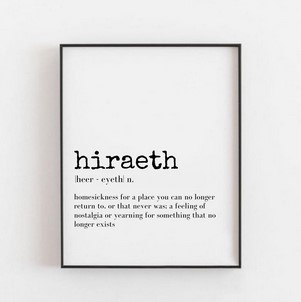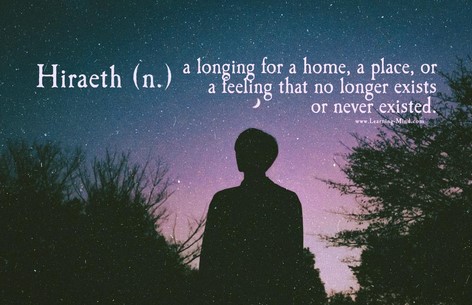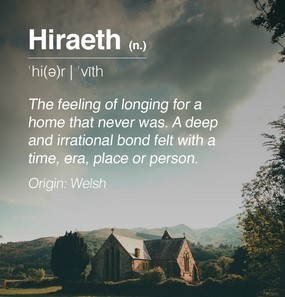Entry tags:
No, hiraeth is not your relatable aesthetic
I'm sure most Welsh people online have been plagued by images like these at some point:



Geiriadur Prifysgol Cymru (The University of Wales Dictionary) defines hiraeth as
Hiraeth is very much a Welsh word that can only be used in the context of Wales and our culture and history. If you are not Welsh, you cannot relate to it. How on earth can you relate to the loss of a culture that you are not a part of? You can't. Hiraeth is very exclusively only applicable to Wales and Welsh culture and history. I've often seen hiraeth compared to the Russian тоска and the Portugese saudade and various other words called "untranslatable" in a variety of languages, but I'd argue that as hiraeth is specific to Welsh culture, тоска is specific to Russian culture. Words in different languages can have similar meanings, but the cultural context that comes with them is going to obviously be different, as these different languages have different peoples, histories, and cultures attached to them. And even though hiraeth is cognate with the Cornish hireth and Breton hiraezh, I'd still argue that they're not direct, interchangeable translations, as hireth would very much carry Cornish cultural context with it, and hiraezh with Breton. This is why we often call hiraeth an untranslatable word - yes we can translate it as "yearning" and "longing" and such, but neither of those English words convey the same context that hiraeth does, and none of those other words in other languages carry the same cultural context either. The word can translate, but its cultural and historical context does not. It's lost all its distinct meaning and soul and Welshness now. The English word "yearning" does not carry that same baggage of culture loss.
It especially feels insulting when English people use the word hiraeth in the contexts of themselves, or when they act like it's an English word. This is very much our word that carries a heavy implication of the cultural and language destruction that you have committed (and continue to commit!) against us. Hiraeth never was, and never will be, applicable to anyone who is not Welsh and especially not to English people.
Perhaps the misuse and misinformation surrounding hiraeth online shouldn't upset me as much as it does. After all, it's continuing an established tradition of the misunderstanding, romanticisation, and othering of Welsh people and our language and culture, and also of the wider Celtic nations. I don't particularly think it's a coincidence that hiraeth has this sort of mystical aesthetic surrounding it online; people love to call the Celtic languages "magical" or "mythical", or think that they have some sort of inherent "otherworldly" or "elvish" quality to them (I don't think we can blame Tolkien solely for this, since this sort of attitude about Celtic languages and peoples has been on-going for hundreds, if not thousands, of years, but I do think he had a large part in adding to it in more recent times). I think there's something about this assumed, and often subconscious, romanticisation of Celtic languages that make hiraeth easy for certain people to latch on to, as they focus on the prettier, more poetic meaning of the word, and not the cultural erasure that comes with it. Our languages and cultures are marginalised, but that just makes our words more beautiful and exotic and interesting, apparently, and that's the sort of surface-level stuff that non-Celtic people seem to want to engage with, and not our heavy, difficult histories that have produced concepts such as hiraeth.
To be clear, I do think that hiraeth can certainly be a poetic and beautiful word. There are Welsh poets who have written and said wonderful things about it. But that's not the place of non-Welsh people to do that. And it's such a shame to see a word like this reduced to only widely being know by a sanitised, more easily palatable, Anglicised definition. Stripped of all the intricacies of what it actually is.

hiraeth
|heer-eyeth| n.
homesickness for a place you can no longer return to, or one that never was; a feeling of nostalgia or yearning for something that no longer exists.

Hiraeth (n.)
a longing for a home, a place, or a feeling that no longer exists or never existed.

Hiraeth (n.)Images that have some sort of aesthetic appeal, which sanitise and disconnect hiraeth from it's Welshness, and sometimes go as far as to claim it's an English word. And if they do acknowledge it's a Welsh word, it's always detached from the culture and history surrounding the word, and simply paint it as "longing" without any of its distinct Welshness. Often posted on some "cozy", "witchy", "cottagecore" blog with a distinct aesthetic centring around it being mystical and magical, at least in my experience. They always paint hiraeth as something poetic and vaguely mythical, that everyone who's not Welsh can also relate to. The (mis)use of the word on the internet is something that continues to bewilder and upset me every day.
'hiīth
The feeling of longing for a home that never was. A deep and irrational bond felt with a time, era, place or person.
Origin: Welsh
Geiriadur Prifysgol Cymru (The University of Wales Dictionary) defines hiraeth as
grief or sadness after the lost or departed, longing, yearning, nostalgia, wistfulness, homesickness, earnest desire. It's also cognate with the Cornish "hireth", the Breton "hiraezh", and the Irish "síreacht". Even Wikipedia recognises it as "a homesickness tinged with grief and sadness over the lost or departed, especially in the context of Wales and Welsh culture. It is a mixture of longing, yearning, nostalgia, wistfulness or an earnest desire for the Wales of the past", so why the hiraeth-bloggers don't seem to be able to do a quick bit of googling the word to find this, is beyond me. So yes, hiraeth does very much mean "yearning" and "longing" and similar things that these inspirational-quote-esque images will tell you. But I think for a lot of Welsh people, hiraeth very much carries a certain cultural and historical baggage that is always left out of what the "cozy cottagecore" bloggers will say about the word. That "yearning" is extremely related to the destruction of our culture and language at the hands of the English, and a longing to go back to how things were before - when our culture was less Anglicised, when we all were able to speak our own language, before our right to govern ourselves was taken from us, before England destroyed our communities and stole our resources....
Hiraeth is very much a Welsh word that can only be used in the context of Wales and our culture and history. If you are not Welsh, you cannot relate to it. How on earth can you relate to the loss of a culture that you are not a part of? You can't. Hiraeth is very exclusively only applicable to Wales and Welsh culture and history. I've often seen hiraeth compared to the Russian тоска and the Portugese saudade and various other words called "untranslatable" in a variety of languages, but I'd argue that as hiraeth is specific to Welsh culture, тоска is specific to Russian culture. Words in different languages can have similar meanings, but the cultural context that comes with them is going to obviously be different, as these different languages have different peoples, histories, and cultures attached to them. And even though hiraeth is cognate with the Cornish hireth and Breton hiraezh, I'd still argue that they're not direct, interchangeable translations, as hireth would very much carry Cornish cultural context with it, and hiraezh with Breton. This is why we often call hiraeth an untranslatable word - yes we can translate it as "yearning" and "longing" and such, but neither of those English words convey the same context that hiraeth does, and none of those other words in other languages carry the same cultural context either. The word can translate, but its cultural and historical context does not. It's lost all its distinct meaning and soul and Welshness now. The English word "yearning" does not carry that same baggage of culture loss.
It especially feels insulting when English people use the word hiraeth in the contexts of themselves, or when they act like it's an English word. This is very much our word that carries a heavy implication of the cultural and language destruction that you have committed (and continue to commit!) against us. Hiraeth never was, and never will be, applicable to anyone who is not Welsh and especially not to English people.
Perhaps the misuse and misinformation surrounding hiraeth online shouldn't upset me as much as it does. After all, it's continuing an established tradition of the misunderstanding, romanticisation, and othering of Welsh people and our language and culture, and also of the wider Celtic nations. I don't particularly think it's a coincidence that hiraeth has this sort of mystical aesthetic surrounding it online; people love to call the Celtic languages "magical" or "mythical", or think that they have some sort of inherent "otherworldly" or "elvish" quality to them (I don't think we can blame Tolkien solely for this, since this sort of attitude about Celtic languages and peoples has been on-going for hundreds, if not thousands, of years, but I do think he had a large part in adding to it in more recent times). I think there's something about this assumed, and often subconscious, romanticisation of Celtic languages that make hiraeth easy for certain people to latch on to, as they focus on the prettier, more poetic meaning of the word, and not the cultural erasure that comes with it. Our languages and cultures are marginalised, but that just makes our words more beautiful and exotic and interesting, apparently, and that's the sort of surface-level stuff that non-Celtic people seem to want to engage with, and not our heavy, difficult histories that have produced concepts such as hiraeth.
To be clear, I do think that hiraeth can certainly be a poetic and beautiful word. There are Welsh poets who have written and said wonderful things about it. But that's not the place of non-Welsh people to do that. And it's such a shame to see a word like this reduced to only widely being know by a sanitised, more easily palatable, Anglicised definition. Stripped of all the intricacies of what it actually is.
no subject
no subject